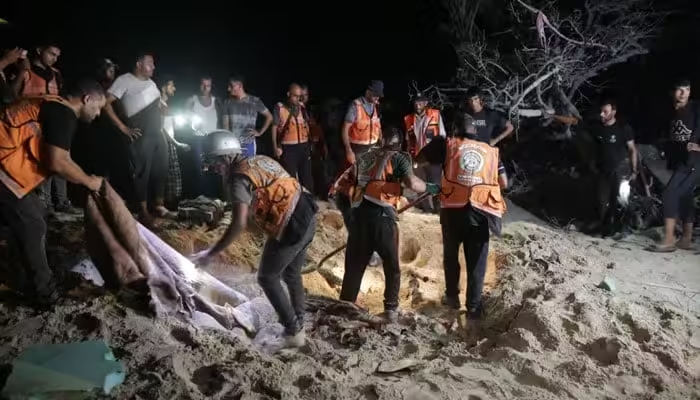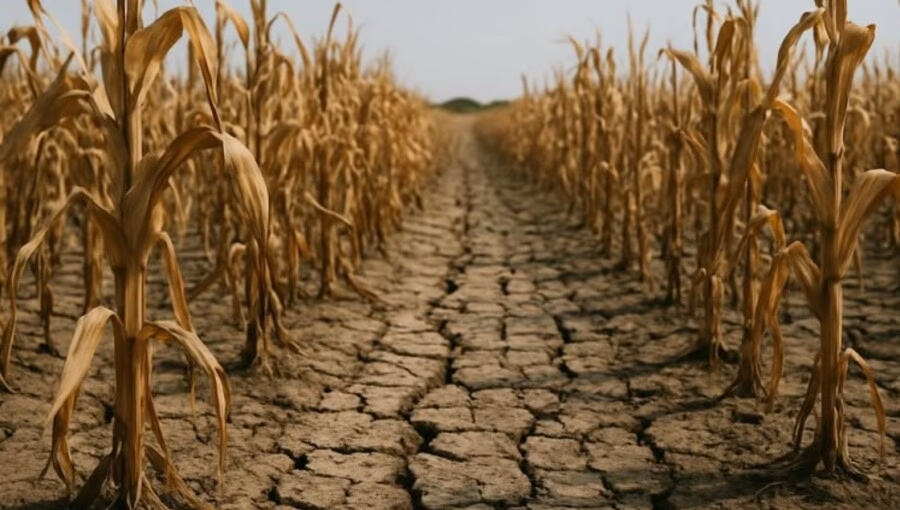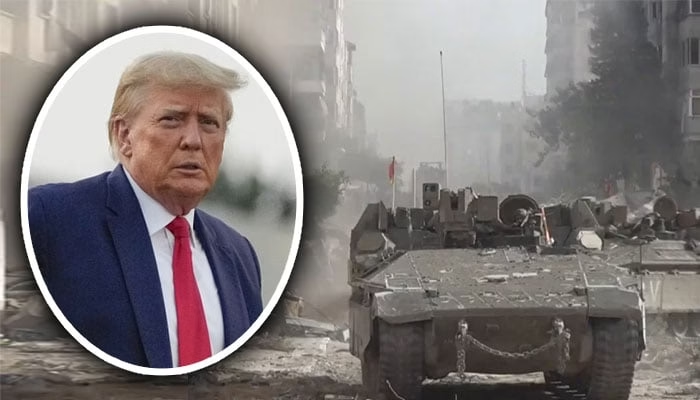In yet another tragic development, an Israeli military attack targeted the al-Mawasi camp in Gaza, resulting in the deaths of 40 Palestinians and leaving 60 others injured. The bombardment, described as one of the most intense in recent days, has created deep craters in the settlement, making rescue operations difficult as authorities struggle to recover bodies trapped under the rubble. The ongoing Israeli-Palestinian conflict has reached alarming levels, with repeated attacks devastating Gaza’s civilian population, especially its women and children.
The Attack on Al-Mawasi Camp
The al-Mawasi camp, located in the southern part of the Gaza Strip, was struck by heavy Israeli bombing, even though it had been declared a relatively safe zone. The bombardment left 30-foot deep craters, a testament to the severity of the attack. Rescue workers and local authorities faced enormous challenges as they tried to locate the bodies of those buried under the destruction. The deep craters, along with the vast debris, slowed down the rescue efforts, increasing the likelihood that many more lives may be lost.
Foreign media outlets have reported on the tragedy, highlighting the continuing violence in Gaza and the increasing toll on innocent civilians. The al-Mawasi camp attack is just one in a series of assaults that have decimated the population and left many in dire need of humanitarian assistance.
Impact on Civilians and Children
The human cost of these attacks continues to rise, with children and women being disproportionately affected. Since the escalation of the conflict on October 7, 2023, thousands of children have been killed. The total number of Palestinians martyred in Israeli attacks has now surpassed 40,972, while more than 94,761 individuals have been injured. A heartbreaking reality is that over half of these casualties are women and children, underscoring the indiscriminate nature of the bombings.
In addition to the immediate death toll, the destruction of homes, schools, and essential infrastructure has displaced millions of people. The displacement has created a humanitarian crisis, with families living in overcrowded shelters, lacking access to basic necessities such as food, water, and medical care.
Israeli Army Detains UN Staff
In a further development, Israeli forces detained United Nations staff members who were on their way to northern Gaza for a polio vaccination campaign. According to reports, the Israeli army not only detained the staff but also used bulldozers to damage their vehicles, obstructing the crucial health campaign aimed at protecting vulnerable children from disease in the war-torn region. This incident highlights the broader challenges faced by humanitarian organizations trying to provide aid and essential services in conflict zones.
The detention of UN staff and the destruction of their vehicles have raised serious concerns about the treatment of international organizations working in Gaza. Such actions hinder critical efforts to alleviate the suffering of civilians, especially as medical facilities and services are already stretched thin due to ongoing bombardments.
Forced Evictions in Nablus
In addition to the bombing in Gaza, the Israeli government has issued orders for the eviction of Palestinians in three villages in Nablus. These evictions are seen as part of a broader strategy to expand Israeli settlements in occupied territories, further displacing Palestinian families from their ancestral lands. The international community has repeatedly condemned such actions, viewing them as illegal under international law. However, the evictions continue, adding another layer of hardship to the lives of Palestinians already struggling with the consequences of war.
The Ongoing Humanitarian Crisis
The humanitarian crisis in Gaza is worsening with each passing day. Israel’s indiscriminate bombing has left millions displaced, without access to food, clean water, electricity, or medical care. The destruction of homes, schools, hospitals, and other essential infrastructure has created a dire situation for the population. The displacement of civilians is particularly concerning as it exacerbates the already precarious living conditions in Gaza, where access to humanitarian aid is limited due to the ongoing blockade and military actions.
Recent reports indicate that schools in Gaza have also been heavily affected, with thousands of children deprived of education as schools are either destroyed or used as shelters for displaced families. The long-term impact of this disruption to education will likely be felt for generations to come, as children are denied the opportunity to learn, grow, and rebuild their lives.
International Response and Calls for Ceasefire
The international community has repeatedly called for a ceasefire and urged both Israel and Palestinian militant groups to come to the negotiating table. Despite these calls, the violence shows no signs of abating. Humanitarian organizations and world leaders continue to stress the need for immediate aid and relief to reach the affected populations, especially children, women, and the elderly.
However, the lack of concrete actions to stop the violence has led to frustration among many global observers. The United Nations, alongside other international bodies, has issued several resolutions condemning the attacks on civilians and urging all parties to respect international humanitarian law. Yet, these resolutions have so far failed to bring about meaningful change on the ground.
The Need for Urgent Intervention
The latest attack on al-Mawasi camp is a tragic reminder of the escalating human toll in Gaza. The deaths of 40 more Palestinians, including children and women, further underscore the urgent need for a peaceful resolution to the conflict. The international community must step up its efforts to bring both sides to the negotiating table and ensure that the violence stops before more lives are lost.
As the number of casualties continues to rise and more Palestinians are displaced, the situation in Gaza remains critical. The humanitarian needs are immense, and without immediate intervention, the lives of countless more civilians hang in the balance. The world must not turn a blind eye to the suffering in Gaza and must push for an end to the violence and a lasting peace.



